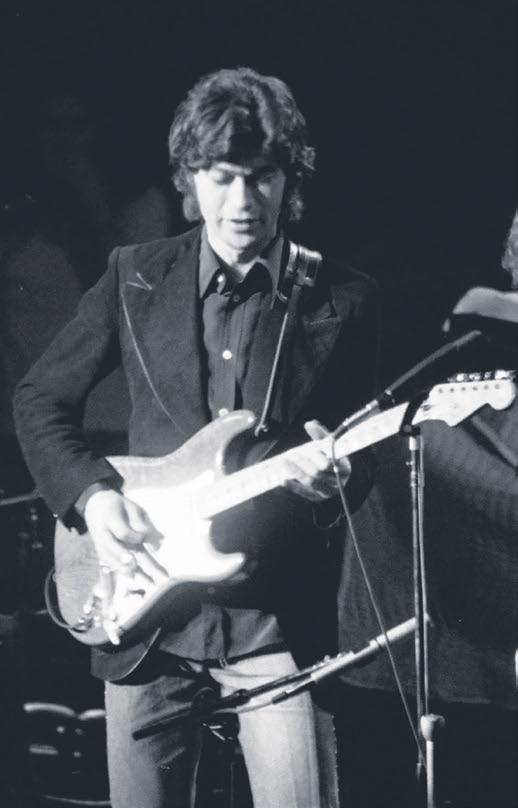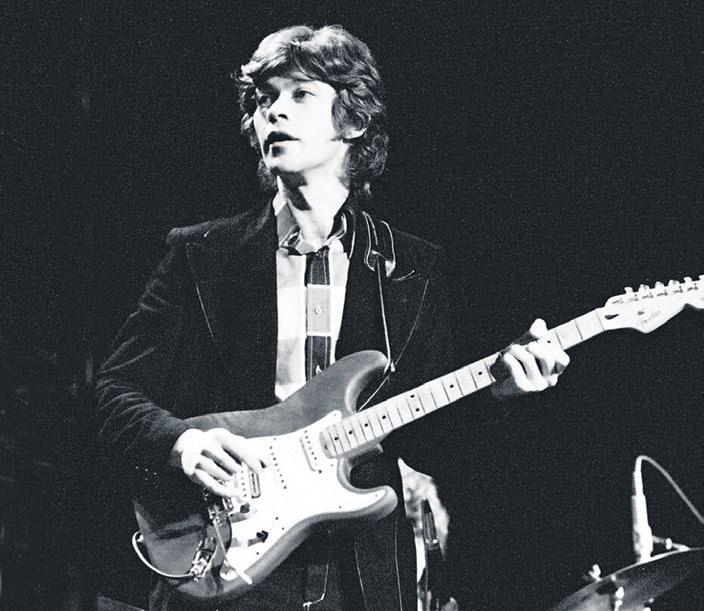
4 minute read
Robbie Robertson, 80, dies; Canadian songwriter captured American spirit
By JIM FARBER
Robbie Robertson, the chief composer and lead guitarist for The Band, whose work offered a rustic vision of America that seemed at once mythic and authentic, in the process helping to inspire the genre that came to be known as Americana, died Wednesday in Los Angeles. He was 80. His manager, Jared Levine, said he died after a long illness.
Advertisement
The songs that Robertson, a Canadian, wrote for The Band used enigmatic lyrics to evoke a hard and colorful America of yore, a feat coming from someone not born in the United States. With uncommon conviction, they conjured a wild place, often centered in the South, peopled by rough-hewed characters, from the defeated Confederate soldier in “The Night They Drove Old Dixie Down” to the tough union worker of “King Harvest Has Surely Come” to the shady creatures in “Life Is a Carnival.” tial American genre, including folk, country,ded compositions first appeared on albums by The Band in the late 1960s, they felt vital
“I wanted to write music that felt likerrow, yesterday — that had this lost-in-time quality,” Robertson said in a 1995 interview for the public television series “Shakespeares cumentary “Once Were Brothers,” Bruce Springsteen said, “It’s like you’d never heard ne else went right,” Robertson said. The ripple effect of that sound and image — unveiled on The Band’s first album, “Music From Big Pink,” released in 1968 — went wide on impact, landing the group on the cover of Time magazine in 1970 and inspiring a host of major artists to create their own homespun amalgams, from the Grateful Dead’s album “American Beauty” (1970) to Elton John’s “Tumbleweed Connection,” released the next year.
In its day, The Band’s music also stood out by inverting the increasing volume anddestepping its accent on youthful rebellion.
The guitarist and songwriter Robbie Robertson playing with Bob Dylan at Madison Square Garden in New York, on Jan. 30, 1974. Robertson, the chief composer and lead guitarist for the Band, whose work offered a rustic vision of America that seemed at once mythic and authentic, in the process helping to inspire the genre that came to be known as Americana, died on Wednesday, Aug. 9, 2023 in Los Angeles. He was 80.
The Band’s music so affected Robertson’s fellow guitarist Eric Clapton that he lobbied for entry into their ranks. (The offer was politely declined.) A quarter-century later, The Band’s music provided a key template for the acts first labeled Americana, including Son Volt, Wilco and Lucinda Williams, as well as for their sonic heirs.
Though Robertson dominated The Band’s writing credits, he frequently emphasized the importance of all five members. “Everybody did something that raised the level of what we were doing to a stronger place,” he told The Guardian in 2019. “They’re all unique characters you could read about in a book,” he told Musician magazine in 1982.
Three of his fellow members — drummer Levon Helm, pianist Richard Manuel and bassist Rick Danko — expressed those characters in distinctly aching vocals, Robertson rarely sang lead, instead finding his voice in the guitar.
Continues on page 18
From page 17

The lofty stature of The Band was further burnished by their participation in several seminal events in the history of Bob Dylan. They served as his backing group during the historic 1965-66 tour that found him “going electric,” to the horror of folk fundamentalists who booed his move away from his original acoustic style. “When people boo you night after night, it can affect your confidence,” Robertson told The Guardian. But, he added, “We didn’t budge. The more they booed, the louder we got.”
In “Once Were Brothers,” Dylan called the group “gallant knights” for sticking with him.
In the summer of 1967, The Band went to live with Dylan in Woodstock, New York, where together they recorded a trove of important songs, some of which later leaked out in the form of the first significant bootleg record, nicknamed “The Great White Wonder.” Key songs from those sessions, mainly written by Dylan but augmented by pieces written by members of The Band including Robertson, didn’t enjoy an official release until 1975, as the double album “The Basement Tapes.” It became a Top 10 hit and inspired New York Times critic John Rockwell to call it “one of the greatest albums in the history of American popular music.”
In 1974, The Band reunited with Dylan, backing him on the album “Planet Waves,” which became a No. 1 Billboard hit, and then launching a tour that yielded the gold concert recording “Before the Flood.”
Two years later, The Band gave what at the time was called its final concert, held in San Francisco and billed at the time as “The Last Waltz.” An all-star affair, it featured guest artists including Joni Mitchell, Van Morrison, Muddy Waters and Neil Young, as well as Dylan. A film of the show, released in 1978 and directed by Martin Scorsese, was lionized by Rolling Stone magazine in 2020 as “the greatest concert movie of all time.” The Band was inducted into the Rock & Roll Hall of Fame in 1994.

Some years after the group’s demise, in 1987, Robertson began a solo career with an album simply titled “Robbie Robertson.” In the decades that followed, he released four more solo albums, though only the first one went gold.
Jamie Royal Robertson was born on July 5, 1943, in Toronto. His mother, Rosemary Dolly Chrysler, was a Mohawk who had been raised on the Six Nations Reserve near Toronto. The man whom he believed to be his father and who raised him until he was in his early teens, James Robertson, was a factory worker.
When he was a child, his mother often took him to the Six Nations Reserve where, he told The Guardian, “it seemed to me that everyone played a musical instrument or sang or danced. I thought, ‘I’ve got to get into this club. I said, ‘I think the guitar looks pretty cool.’”
His mother bought him one.
“Rock ‘n’ roll suddenly hit me when I was 13 years old,” he told Classic Rock magazine in 2019. “That was it for me. Within weeks I was in my first band.”
Around that time, his parents separated and his mother told him that his biological father was a Jewish professional gambler named Alexander David Klegerman who had been killed in a hit-and-run accident before she met James Robertson. In his memoir, “Testimony” (2016), Robertson wryly commented on his Indigenous and Jewish heritage.
“You could say I’m an expert when it comes to persecution,” he wrote.
When “Music From Big Pink” was released in the summer of 1968, it boasted seminal songs written by Robertson such as “The Weight” and “Chest Fever,” along with strong









